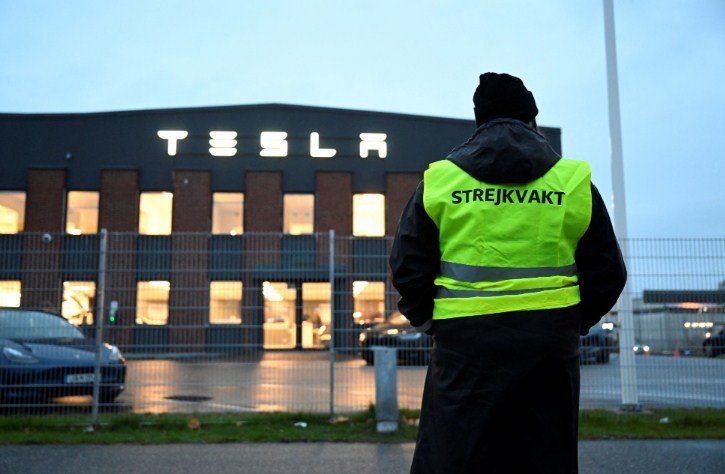Tesla, the world’s largest electric car company, is facing a major challenge in Sweden, where unions have launched a strike that has disrupted its operations and services. The strike, which started on November 10, involves about 70 workers at Tesla’s seven repair shops across the country. They are demanding better wages, working conditions, and job security from the company, which they accuse of violating labor laws and workers’ rights.
The strike has had a ripple effect on Tesla’s business in Sweden, where it sold more than 10,000 vehicles last year. For the past week, no Tesla cars have been imported or exported through the four biggest ports in the country, as the Swedish Transport Workers’ Union has expressed solidarity with the striking workers. Starting Friday, Tesla’s Superchargers, which provide fast charging for its vehicles, will not be repaired if they break down. Next week, parts deliveries to repair shops and garbage pickups will also stop, as other unions join the action.
The strike is a sign of how powerful and pervasive labor groups are in Sweden, a country with a strong tradition of collective bargaining and workers’ participation. It also shows how Tesla, which has a reputation for being anti-union and resisting workers’ organizing efforts, is facing resistance from its employees in different markets and regions.
Tesla has not commented publicly on the strike or the workers’ demands, but it has reportedly offered a 2.2% wage increase, which the workers have rejected as insufficient. The company has also faced criticism for implementing a new policy that prohibits employees from recording workplace meetings without the consent of all participants, which the workers say violates their rights and the law.
The strike in Sweden is not the first time that Tesla has encountered labor disputes and unionization attempts. In the US, the United Auto Workers and Workers United have tried to organize workers at Tesla’s factories in California and New York, respectively, but have faced retaliation and opposition from the company. The National Labor Relations Board has ruled that Tesla illegally fired workers for supporting unionization and ordered their reinstatement. In Germany, Tesla’s plan to build a Gigafactory near Berlin has also faced delays and protests from environmental groups and local unions.
Tesla’s CEO, Elon Musk, has argued that unions are not necessary for his company, and that they would hinder its innovation and mission to accelerate the transition to sustainable energy. He has also invited the unions to hold a vote at his factories, claiming that he will not interfere with the process. However, many workers and labor activists have questioned his sincerity and motives, and accused him of trying to undermine and intimidate the union supporters.
Tesla’s business in Sweden may resume soon if the company and the workers reach an agreement, but the strike has exposed the challenges and conflicts that Tesla faces as it expands its global presence and influence. The company will have to balance its ambitious goals and vision with the expectations and rights of its employees and stakeholders, and respect the laws and norms of the countries and communities where it operates.

